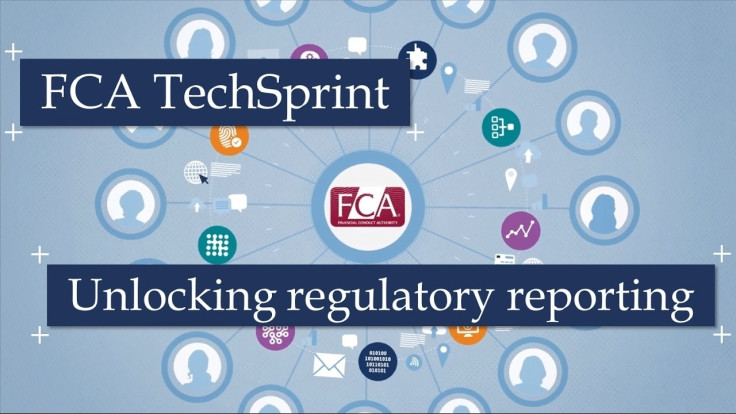FCA and Bank of England surge ahead in Hitachi-hosted TechSprint
The FCA's Christopher Woolard and Oliver Burrows of the Bank of England discuss the Hitachi TechSprint.

The UK is a leader when it comes to using technology to optimise the costly and at times cumbersome world of regulatory compliance – an area known as "regtech". There is a race on to make this type of innovation a reality which can benefit firms, regulators and ultimately consumers.
Collaboration is key to making this happen. The recent two-week TechSprint featuring the Financial Conduct Authority (FCA) and the Bank of England, hosted by Hitachi Vantara did just that. A plethora of institutions and technologists, which also included Grant Thornton, Credit Suisse, Santander, HSBC worked on ways to automate regulatory reporting, a costly and onerous process for financial services firms and one not designed with today's technology in mind.
The ultimate goal is a new a model driven and machine readable regulatory environment. So what does this mean? It means a paradigm shift in how the financial services industry understands, interprets and then reports regulatory information. It means using technology like natural language processing, meta-tagging and even automated smart contracts to link regulation, compliance procedures, firms' policies and standards together with firms' transactional applications and databases.
Oliver Burrows, Chief Data Officer and Head of the Data and Statistics Division, Bank of England, summed up the challenge being addressed: "Can you make this a straight-through process; can you make it machine readable, model driven, machine executable?
"At the moment it can be quite a complicated and lengthy process. If I think about consulting on a new rule or a data collection, it can take two to three years to get a new data collection up and running. That's about translating between concepts that are well understood by regulators right through the chain to finding the actual underlying data in operational systems. That involves a lot of conversations between lawyers, subject matter experts, technologists and all sorts of people."
The TechSprint challenged the teams to take a rule in natural language, code it up and model it, and then do the same thing on the dataset side. "Those templates we are used to seeing filled in with all sorts of numbers – turn that into a machine readable model and then make the whole thing flow right the way through," added Burrows.
One of the participants said the way this is currently done in their firm would involve a hard-wired data lake, absorbing all this information and then a bunch of aggregations happening. By contrast, a demo showed how a rule had been ingested in code which then configures the aggregation you do; make a change to the rule and get a new data collection out the other end.
Technology incubators and accelerators are front and center with both the Bank of England and the FCA; the latter's Regulatory Sandbox has featured prototype fiat digital currencies and AI-based surveillance solutions, and received plaudits for keeping the UK up to speed with other trailblazing regulators like the Monetary Authority of Singapore.
Christopher Woolard, Executive Director of Strategy and Competition, FCA said: "This is not the first TechSprint we've done of this kind but it's certainly the longest, and certainly the most complex. And it's the first in which we have worked in tandem with the Bank [BoE]."
Woolard said the issue is not only about efficiency, there's also a question of reliability of online information as it's handled at every step: "The speed with which that's done, the accuracy with which we inform our own policy making.
"But also there are real costs in terms of time, management effort, distraction that go around these systems. If this can be channeled elsewhere, that can really create public value; that really goes to the heart of why we regulate in the first place - that's a huge prize at the table."
Providing his own definition of "regtech", Woolard said: "We often think about this as a solution for ourselves, how we are going about regulating. But we need to think like we have over the last fortnight. How can you make system changes that could benefit the whole of the financial services landscape, not just the regulators."
Having a seasoned approach has meant collaborating on problems which often fall outside the canon of financial regulation. For instance, in 2016 Hitachi joined the FCA's TechSprint to help address the link between financial difficulty and mental health problems.
"It's about how do we take on a really hard problem that traditional regulation won't get at," said Woolard. "So for example, work we have done around mental health. How technology solutions around personalisation can help those with mental health problems, who are often in quite severe debt in the financial services system."
Nirvana Farhadi, global head of financial services, RegTech, risk and regulatory compliance, Hitachi Vantara, emphasised the essential communication aspect which had come out of two weeks of sprinting.
"If you are going to teach machines to talk to each other, you really have to get people to talk to each other – and talk to each other well, first," she said.
"I think it's been an amazing atmosphere in the last two weeks, to get all these minds in the same room. We've got the regulators there, we've got banks, we've got the institutions, we've got the vendors, and really taking this opportunity to use everyone in the ecosystem to solve for something legitimately."






















